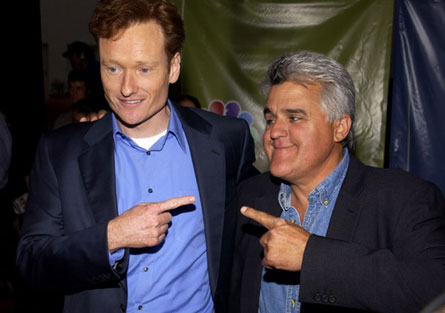The NBC Late-Night Train Wreck
 Big headlines, but no real surprises this week when news leaked that NBC is finally ready to raise the white flag on its bumble headed talk show musical chairs experiment. The failed effort to move late-night into prime time (cost savings) and move late-late night audiences into higher paying ad slots was an interesting one on paper, but much less so to viewers who watch and actually enjoy talk television. What is yet to be seen is whether this will become one of the biggest mistakes by a corporation in completely destroying a successful franchise/brand in history. Coca-Cola survived the “New Coke” experiment, but the verdict is still out on NBC and its “Tonight Show” franchise. More likely than not, the victim will continue to bleed for another couple of years, and eventually, the “Tonight Show” brand will return to its old levels of popularity and profitability.
Big headlines, but no real surprises this week when news leaked that NBC is finally ready to raise the white flag on its bumble headed talk show musical chairs experiment. The failed effort to move late-night into prime time (cost savings) and move late-late night audiences into higher paying ad slots was an interesting one on paper, but much less so to viewers who watch and actually enjoy talk television. What is yet to be seen is whether this will become one of the biggest mistakes by a corporation in completely destroying a successful franchise/brand in history. Coca-Cola survived the “New Coke” experiment, but the verdict is still out on NBC and its “Tonight Show” franchise. More likely than not, the victim will continue to bleed for another couple of years, and eventually, the “Tonight Show” brand will return to its old levels of popularity and profitability.
The reasons it will survive are numerous, including the fact that with the exception of Comedy Central, the cable nets aren’t providing anything in the way of serious competition to network talk shows. More importantly is history. Even for younger generations (especially as they grow older and become less cool conscious and more boring in their routines), NBC and CBS are simply where one turns for this form of entertainment.
And that, of course, is the point that NBC seemed to miss with this failed experiment–the very particular role that talk shows play in viewers’ lives. With notable exceptions, the late night talk show has been a tremendously stable form of television entertainment, with changes coming very gradually and more reflective of cultural sensibility than artistic creativity. Simply put, audiences have historically tuned in for two reasons. The first is content–a regular diet of 1) a host-persona they are attracted to (this being most important), 2) a steady diet of celebrities and people in the news as guests, 3) some music, and 4) an occasional comedy sketch or public oddity. That’s it. But while that is also what “The Jay Leno Show” and “The Tonight Show” continued to offer during NBC’s juggling act, NBC violated the second component: daypart. When it comes to cable nets, dayparts are really irrelevant (think Comedy Central or HBO, for instance). But for most viewers, dayparts are what defines broadcast networks. We know where to look and when for a very particular form of routinized pleasure. And when that changes, we often don’t like it (this can even include our finickyness when the networks move a Sunday night drama to Tuesday night).
But it is the interrelationship between these two central components of late-night talk–the hosts/content and the time-slot/routine–that was violated in the NBC decision. Leno simply isn’t prime time, just as Conan isn’t early late-night (not to mention that Conan is New York, not L.A.). Perhaps NBC just didn’t run this through enough focus groups, or failed to do so properly. But one would hope that with such a dominant role the network has played in creating this relationship to viewers to being with, it would “understand” both itself and its viewers better by this point in the history of television.



Great point about the lived experience of late night talk shows, seems like the genre (and audience) least amenable to change and most reliant on its daypart. These reports go on and on about NBC brass and affiliates, but no one mentions how Leno’s move to prime-time disrupted the sleeping patterns of old people everywhere.
Amen, re: daypart. Roger Silverstone’s point about television providing ontological security is rarely clearer than with latenight talk shows that rock one to sleep with inane chat, and inconsequentiality that’s just kind of warm and inviting. A firm reminder, then, was served to NBC that DVRs or no DVRs, timing still matters
Yeah, I think both Howard Bausinger and Roger Livingstone make that point about the morning newspaper. But what neither mentioned (to my memory) is the feeling when my NYTimes doesn’t arrive, and instead, I am stuck with The Virginian-Pilot instead. While I have a paper (and the security it represents), that security (or feeling that the world is OK) is upset by being relegated to the reality presented by the VP. I guess Conan becomes the VP in this example (poor bastard).
Now that this news is confirmed, may I just say Praise the Lords of Television. It was important that this experiment fail, and be noted to fail. Whereas everyone else in the country seems to know it failed, it’s good that NBC realizes that too.
But now what? SVU reruns every evening?